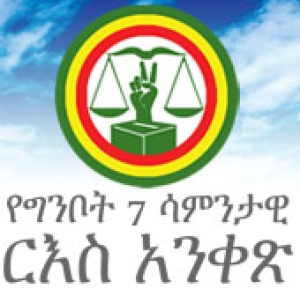September 26, 2013
 Editor’s Note: On Sunday September 22, 2013, the Ginbot 7 leadership had a very revealing and open discussion in Washington DC meeting like it has never had before . As you know, the issue of working with Eritrea has been a bone in the throat for G7 as well as for its supporters around the world. Many have argued against using Eritrea as a spring board to wage an armed struggle against TPLF.
Editor’s Note: On Sunday September 22, 2013, the Ginbot 7 leadership had a very revealing and open discussion in Washington DC meeting like it has never had before . As you know, the issue of working with Eritrea has been a bone in the throat for G7 as well as for its supporters around the world. Many have argued against using Eritrea as a spring board to wage an armed struggle against TPLF.Opponents claim that Eritrea can not be trusted based on their experience with Isayas Afeworki so far and his public rhetoric as it relates to Ethiopia. They may have a point. But the problem is that they don’t practice the position they defend or argue for. They don’t provide an alternative and actually implement that alternative. For example, they don’t answer to the question of where to wage an armed struggle and show us the way by an example. They don’t. For instance, what don’t they find a place within Ethiopia and wage an armed struggle? What do they go and practice what they preach instead of simply analyzing and arguing from the comfort of their homes in the West. What they do is simply disagree and sometimes with bitterness and even animosity against G7 position towards Eritrea.
Instead of making an honest and logical attempt to convince and win our support, those who oppose G7′s position in Eritrea use intimidation, name callings, insults, put downs and inuendos to impose their opinion on G7 and its supporters. But the irony is that these forces claim to believe and fight for democracy in Ethiopia and yet they impose their position on others. G7 has repeatedly expressed the right of any political entity to follow a path it believes in without imposing its policy or belief on any one else except asking their support.
G7 has often made clear that it does not oppose other political parties who pursue a political path different than its own. It is interesting whether we know how to win support with a clean logical argument backed by results in the ground instead of an endless ineundos and name callings.
Those who opposes G7 are not all in the same wave length. Pro-TPLF mercenaries like Awramba Times editor are going against G7 to accomplish their paid assignments. There is no surprise about them. They are part of the package. There is also a second group that questions and suspects a multi-national political force like G7 for fear of revenge by TPLF victims in the form of genocide or a lesser nationwide violence against the Tigrian population.
These group has a legitmate fear. But opposing such a political force as G7 is not a solution to their fear. In fact, a force such as G7, if strengthened, may help stabilize the country by preventing a possible chaos and ethnic violence in Ethiopia when TPLF collapses.
And there is a third group. These are political organizations who are competing for power in Ethiopia after TPLF. They believe if they don’t cook the dish, it does not taste good. They want power at any cost and by any means necessary. They are ego-driven and uncompromising. Nothing satisfies them until they are in power to implement their belief. They oppose everything any opponent does. They deliberately or honestly believe that truth is on their side. Doing so is wounding their ego and it is relinquishing the possibility of power in Ethiopia.
Those who opposes G7 are not all in the same wave length. Pro-TPLF mercenaries like Awramba Times editor are going against G7 to accomplish their paid assignments. There is no surprise about them. They are part of the package. There is also a second group that questions and suspects a multi-national political force like G7 for fear of revenge by TPLF victims in the form of genocide or a lesser nationwide violence against the Tigrian population.
These group has a legitmate fear. But opposing such a political force as G7 is not a solution to their fear. In fact, a force such as G7, if strengthened, may help stabilize the country by preventing a possible chaos and ethnic violence in Ethiopia when TPLF collapses.
And there is a third group. These are political organizations who are competing for power in Ethiopia after TPLF. They believe if they don’t cook the dish, it does not taste good. They want power at any cost and by any means necessary. They are ego-driven and uncompromising. Nothing satisfies them until they are in power to implement their belief. They oppose everything any opponent does. They deliberately or honestly believe that truth is on their side. Doing so is wounding their ego and it is relinquishing the possibility of power in Ethiopia.
There is one final group which I consider innocent but suspicious. Our story with Eritrea is full of suspicions and actual heart-breaking experience due to the war waged between Ethiopia and Eritrea for over 40 years now. They don’t trust anything related to Eritrea no matter who said what including God. These group has a legitmate concern but suspicion should not tie our hands and prevent us from doing what needs to be done. Our situation today is desperate. TPLF has done and still doing all it can to destroy our people and country. These suspicioius group should know that there are times in life when you have to do what you got to do to get out of a rock and hard place by swallowing our pride and controlling our suspicion.There is a saying in our country,” ቀን እስኪአልፍልህ የአባትህ ባርያ ይግዛህ” that we should follow. These group has no alternative except to give it a try while holding its suspicions. At this point, all of us have one universal enemy. And we have to focus on it. And that is TPLF. And it is wise to talk about our differences after we free Ethiopia from TPLF by any means necessary.
The G7 leadership has directly presented the question in a ‘take it or leave’ it manner to the audience and the Diaspora watching on ESAT.

Click the image above to watch the G7 meeting in DC on September 22, 2013
Ato Andargachew Tsige, secretary of G7, has explained in detail about the Eritrean question during the meeting. It may be hard to tell if every body is convinced. With all their suspicions remaining, there is no doubt many may be considering to give G7′s policy on Eritrea a chance, if it has any possibility of working, given the dire and critical circumstances Ethiopia has found itself at this time.
There is no sure thing in life as well as in struggle. You take chances and you take risks. Not a blind risk but a pragmatic one based on the circumstances you found yourself boxed in. Not taking that risk, no matter how difficult, is committing a self-inflicted suicide. You put all your options on the table. And you pick the one with the least risk. And then you move on.
And if not, the choice is to get stuck in some meaningless and fruitless activity and continue to waste time, money and even lives for nothing and finally give up and be forgotten. G7 seems to have made a decision to take the least risky option, according to Ato Andargachew Tsige, and is pursuing it with resolve.
And for those of us with an apposing view, let us do what we believe in without imposing our position on G7 and its policy towards Eritrea. According to Ato Andargachew Tsige, G7 is not imposing its position on any person or political entity. He said they don’t oppose the positions other political organizations are taking when it comes to Eritrea or any other political position.
The take home message is that, we in the opposition camp, should all follow our individual political choices in our quest to remove TPLF from power without attacking each other. We all don’t have to come to the same conclusion. Let us just disagree without being disagreeable. There is no need to vehemently be involved in slash and burn campaign against a position we don’t agree on. First, it is not democratic. Second, it is nasty. We will sound like the dictators we claim to hate like Mensgistu and Meles. No one party or person has the monopoly on the truth of what works best to bring TPLF down. The only way to establish that truth is based on the results of a given policy on the ground. And let us all give a chance, with patience, to see what works with our suspicions still intact

Click the image above to watch the G7 meeting in DC on September 22, 2013
Ato Andargachew Tsige, secretary of G7, has explained in detail about the Eritrean question during the meeting. It may be hard to tell if every body is convinced. With all their suspicions remaining, there is no doubt many may be considering to give G7′s policy on Eritrea a chance, if it has any possibility of working, given the dire and critical circumstances Ethiopia has found itself at this time.
There is no sure thing in life as well as in struggle. You take chances and you take risks. Not a blind risk but a pragmatic one based on the circumstances you found yourself boxed in. Not taking that risk, no matter how difficult, is committing a self-inflicted suicide. You put all your options on the table. And you pick the one with the least risk. And then you move on.
And if not, the choice is to get stuck in some meaningless and fruitless activity and continue to waste time, money and even lives for nothing and finally give up and be forgotten. G7 seems to have made a decision to take the least risky option, according to Ato Andargachew Tsige, and is pursuing it with resolve.
And for those of us with an apposing view, let us do what we believe in without imposing our position on G7 and its policy towards Eritrea. According to Ato Andargachew Tsige, G7 is not imposing its position on any person or political entity. He said they don’t oppose the positions other political organizations are taking when it comes to Eritrea or any other political position.
The take home message is that, we in the opposition camp, should all follow our individual political choices in our quest to remove TPLF from power without attacking each other. We all don’t have to come to the same conclusion. Let us just disagree without being disagreeable. There is no need to vehemently be involved in slash and burn campaign against a position we don’t agree on. First, it is not democratic. Second, it is nasty. We will sound like the dictators we claim to hate like Mensgistu and Meles. No one party or person has the monopoly on the truth of what works best to bring TPLF down. The only way to establish that truth is based on the results of a given policy on the ground. And let us all give a chance, with patience, to see what works with our suspicions still intact



















 sep14,2013
sep14,2013



